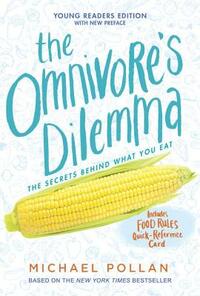Take a photo of a barcode or cover
informative
reflective
slow-paced
If you want to be completely disgusted by industrial farming, and therefore, change your whole outlook on where your food comes from...this book is for you.
First half was packed with really interesting information. Last half could have been shortened by 100 pages considering how it was just his firsthand experience hunting and gathering and it really wasn't all that interesting and he was trying to be super poetic about it.
It's a very journalistic read! It was tough to get through because, at certain points, I had lost interest, so I took some breaks. At other points, it was tough to get through, like when discussing the animals' living conditions. Overall, I'm glad I read it! Everyone should have an idea of where our food comes from!
I spent two hours yesterday, with Food Network playing in the background, explaining to my highly skeptical sister how pretty much everything we eat can in some way be traced back to corn. Then I explained grass farming and hunting wild boar and driving to a burned down forest in the middle of winter to forage exotic wild mushrooms. And all of this, I learned from The Omnivore's Dilemma.
Author Michael Pollan fascinates with his journey all over the nation searching for our epicurean roots, no pun intended. This narrative nonfiction adventure is brimming with highly detailed and seemingly well-researched information about where our food comes from, now that we tend to put little thought into what's really for dinner.
For the most part, he succeeds in informing and engaging simultaneously. But what I found most fascinating were his discussions of the great debates in food right now: preservatives, organics, animal rights and local farming. It did, as he suggests, change the way I think about my food before consumption (though, I can't say it changed many of my habits).
In all, a fascinating, though I wouldn't say quick, read. There were a few lulls in the narrative, and in fact, I think I read two books during the time I read this one. But it's worth it to stick with this one just so you can gross your friends out while you're going through the McDonald's drive-thru.
Author Michael Pollan fascinates with his journey all over the nation searching for our epicurean roots, no pun intended. This narrative nonfiction adventure is brimming with highly detailed and seemingly well-researched information about where our food comes from, now that we tend to put little thought into what's really for dinner.
For the most part, he succeeds in informing and engaging simultaneously. But what I found most fascinating were his discussions of the great debates in food right now: preservatives, organics, animal rights and local farming. It did, as he suggests, change the way I think about my food before consumption (though, I can't say it changed many of my habits).
In all, a fascinating, though I wouldn't say quick, read. There were a few lulls in the narrative, and in fact, I think I read two books during the time I read this one. But it's worth it to stick with this one just so you can gross your friends out while you're going through the McDonald's drive-thru.
A very interesting look at America's current food production system, from mainstream to organic to off-the-beaten-path. Will make you want to move to a farm and grow your own food. Or at least it did for me.
The first two parts of The Omnivore's Dilemma ("Corn" and "Grass") and the chapter on fungi definitely caught and easily kept my attention, all of them considering and investigating issues with both insight and curiosity. Those sections of the book where the author gets involved in the processing of animals to meat, on a physical and an ethical level, come across as less confident and coherent when compared to the chapters where he focuses on observing these processes; also, he uses some elitist and outdated cultural views and terminology here and there. Still, Pollan shows to be a very skilled writer who delivers a well-structured book on the U.S. food industry.
I was actually kind of let down by this book after seeing all the high ratings... but as nerdy and non-fiction-loving as I am, most of this book bored me to tears. Learning about how basically everything we eat comes from corn and about the ethics of eating animals was interesting, learning about farming was really not - got to feel a bit like a high school text book.
informative
inspiring
reflective
slow-paced




